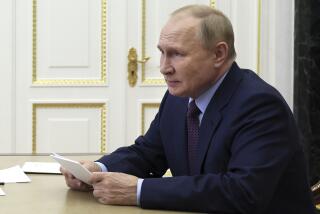German Agency Accused of Spying on Journalists
- Share via
BERLIN — Germany’s foreign intelligence service has been accused of keeping files on journalists and paying reporters to spy on their colleagues, in a widening scandal that echoes the days of Cold War secret dossiers.
The charges, contained in a confidential government report, have unnerved media organizations and further damaged the reputation of the foreign intelligence agency, which is also under investigation by Parliament for its role in the Iraq war. Parts of the report were leaked to newspapers over the weekend, and lawmakers quickly blamed the agency for violating press freedoms.
Journalists are demanding that the report be made public to gauge the extent of the spying and to protect the credibility of news organizations. The furor has roused memories of the Stasi, the feared East German secret police, which infiltrated all layers of communist-era life. It also has led to questions about the culpability of journalists, including one who reportedly was paid more than $375,000 for snooping on fellow writers for 16 years.
“We don’t know how far this goes,” said Nicole Sauer, a member of the German Journalist Assn. “There should be alarm, but we don’t know yet what is true and what is not true.”
Gerhard Schaefer, a former judge and author of the 170-page report, said in a recent published interview that the practice was “disproportionate, clearly illegal.”
A spokesman for Chancellor Angela Merkel would not comment on the findings Monday, but said, “Let me assure you that the German government has always defended press freedom and the freedom of information as a fundamental right of our democracy.”
The controversy centers on attempts by the foreign intelligence agency, known as the BND, to find leaks in its own organization after several embarrassing stories, including allegations that its own agents were involved in plutonium smuggling. Begun decades ago, the surveillance program gradually enlisted journalist informants to spy on other reporters covering the intelligence community.
“The aim of the contacts was to prevent publication of prejudicial articles and find out where the journalists were getting their information from inside the BND,” Volker Foertsch, a former high intelligence official, told the Berliner Zeitung.
Suspicions over spying intensified in 2005 when then-BND President August Hanning apologized for the surveillance of investigative reporter Erich Schmidt-Eenboom in the 1990s. The reporter’s book, “Undercover,” was critical of the agency. A similar apology was given to Josef Hufelschulte, a reporter for Focus magazine.
Wolfgang Krach, an editor at Sueddeutsche Zeitung, was one of those who was kept under surveillance.
“I was astonished when I found out,” Krach told the German media. “I have researched and written a lot about the BND. But I never thought it possible they would observe journalists in Germany -- and especially not that I would be involved.”
Several alleged spies wrote for major magazines; others were investigative freelancers. The agency was keenly interested in the work of editors and writers at Der Spiegel, the country’s most respected publication. “With the help of several journalists, the authorities tried to get a variety of internal editorial information,” wrote Der Spiegel in a story published Monday.
Investigative journalist Hans Leyendecker said he didn’t believe the spying was systematic. He added, however, that his articles on plutonium smuggling in the 1990s precipitated an effort by the BND to uncover his sources. “They were looking for the leak,” Leyendecker said. “They were trying to find it, but they didn’t.”
The report adds more intrigue to the parliamentary investigation of the BND, after disclosures earlier this year that the agency’s operatives in the Middle East, including Baghdad, shared information with U.S. military forces before and during the American-led 2003 invasion of Iraq.
Germany opposed the war and the BND’s cooperation with the U.S. is viewed by many lawmakers as a betrayal of the country’s intentions.
Many reporters and politicians also are questioning why a foreign intelligence agency was preoccupied with monitoring journalists at home.
“Journalists must not be made accomplices by the secret service to solve its own problems,” said Hubert Burda, president of an association of German magazine publishers. “If everything turns out to be accurate, it is an incredible scandal that the foreign secret service has been observing journalists inside the country.”
More to Read
Sign up for Essential California
The most important California stories and recommendations in your inbox every morning.
You may occasionally receive promotional content from the Los Angeles Times.











